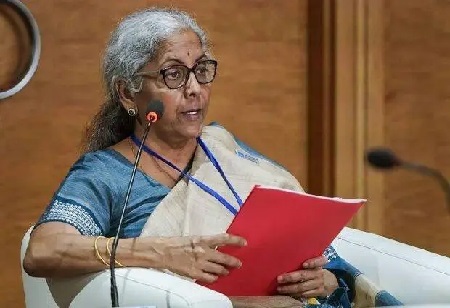FM Nirmala Sitharaman to transfer The Finance Bill, 2023 in Lok Sabha
By Consultants Review Team
 Union Finance Minister Nirmala Sitharaman on 24 March will transfer The Finance Bill, 2023 in Lok Sabha to give effect to the financial proposals of the Central Government for the fiscal year 2023-2024 be taken into consideration. Earlier the Lok Sabha approved the Union Budget envisaging an expenditure of around Rs 45 lakh crore for the fiscal year starting April 1 without any discussion, as the Opposition continued to create a ruckus over demand for a JPC probe into allegations against the Adani Group.
Union Finance Minister Nirmala Sitharaman on 24 March will transfer The Finance Bill, 2023 in Lok Sabha to give effect to the financial proposals of the Central Government for the fiscal year 2023-2024 be taken into consideration. Earlier the Lok Sabha approved the Union Budget envisaging an expenditure of around Rs 45 lakh crore for the fiscal year starting April 1 without any discussion, as the Opposition continued to create a ruckus over demand for a JPC probe into allegations against the Adani Group.
The Lower House of Parliament took up the Demands for Grants and Appropriation Bills after two adjournments as the ruling and Opposition MPs engaged in a matching duet over demands for an apology by Rahul Gandhi and the Adani issue. Most of the second leg of the Budget Session was washed out due to the protest by both sides and it was one of the rare occasions when the Budget was passed without any discussion. Soon after the Lok Sabha reassembled at 6 pm after two adjournments, Speaker Om Birla put the Opposition's cut motion or amendments to the government spending plan to vote which was rejected by voice vote. This was followed by Finance Minister Nirmala Sitharman moving the demands for grants for 2023-24 and relevant Appropriation Bills for discussion and voting.
The Finance Bill 2023 contains tax proposals that Sitharaman had moved while presenting the Budget on February 1. All the budget-related bills will be transmitted to the Rajya Sabha, which cannot make any changes but only return them to the Lok Sabha after discussion as they are classified as 'money bills' requiring approval of the Lower House only. The current Parliament session is scheduled to end on April 6. There is speculation that the duration of the session may be curtailed after the completion of the budgetary exercise.
Unlike in the past, the Lok Sabha this time did not discuss the Demands for Grants of the identified ministries. The Business Advisory Committee had approved the discussion on the ministries of railway, rural development, health, and family welfare, Panchayati Raj, tribal affairs, tourism, and culture. However, no discussion could take place because of the continuous disruption of the House after it reassembled for the second leg of the Budget session.




